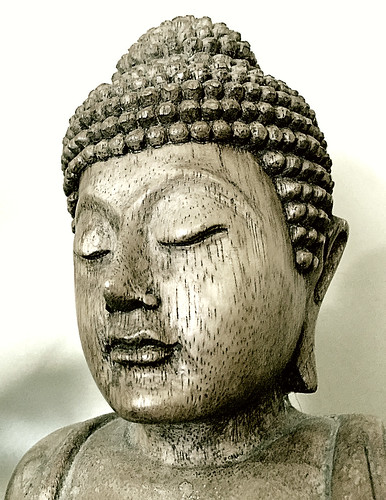|

The Awakened One
* * *
We continue our series on Right View, or Right Understanding, within the Buddhist teaching of the Noble Eight-Fold Path. Last writing, we looked at intentional Dharma Doors, or Truth Doors - openings to insight. Today, we consider spontaneous Dharma Doors. Some Doors appear from our setting up causes and conditions, and some arise unplanned. I will share one spontaneous Truth Door. I will, furthermore, explore body, mind, and speech as avenues of wisdom.
* * *
I sat quietly on the front porch at Greenbough House of Prayer. I had been vowed there as a lay Associate, vows to live a Contemplative Life. One of the founders and one of two on-site contemplatives, Steve, opened the front door to the main house. The door was a screen door. I noticed him entering. I observed him close the screen door after walking over the threshold. He did not release his hand from the door until it closed fully, quietly. I had never witnessed anyone closing a door with such mindfulness and respect. This moment embodied for me a lesson in living contemplatively.
Steve, though he did not intend it, was saying by how he closed that door, "The life you have been vowed to means it matters how you close a door. How you close a door is to be in harmony with how you live every aspect of your life. The world needs you to close doors - so, live - with grace, reverence, and gentleness."
Where I was raised, persons rarely closed doors, screen doors or other doors. Persons slammed doors, meaning they let doors slam themselves. They would open a screen door, walk over the threshold, and let go of the door. You would soon hear a loud bang. Other doors, they would let go of to slam themselves, if they would close themselves; if not, they would pull the door shut, and you would her the bang. A door was not something to respect; it was an object to an end. The door was not alive, it was an inert object - yet, everything is alive, otherwise it would not be.
I saw Steve model the need for nonaggression in our world. Nonaggression is linked with mindfulness and respect. When we close a door, rather than let it slam, we say something about ourselves and the kind of world we wish to live in.
* * *
In Buddhism, we aim to use wisely and mindfully the following three: body, mind, speech. We devote these aspects of being to be instruments of kindness, compassion, and wisdom. Steve taught me through his use of the body. We can gain wisdom by how someone walks, smiles, or handles objects. We can, likewise, learn through how another uses the mind in speech or act. Likely, we have each had a teacher who helped open our minds to truth through her gift of teaching. We can gain insight in how a person uses the voice, for example, in laughter, talk, song, or chant.
How someone does not use the body, mind, or speech can guide us in wise living as well. Mindful beings teach as much through not-doing, not-thinking, and not-speaking as doing, thinking, and speaking. So, we need to look deeply and listen deeply to what is not present as well as is present.
We each have the opportunity to be a means of truth through body, mind, and speech. Anyone can teach us, and we can teach anyone who looks and listens mindfully. A rock can become a Dharma Door, if we will look at and listen to the rock. Sages, human and non-human, are all about us. Dharma Doors are opening everywhere.
* * *
Who has modeled for you the values you aspire to live through how they act or speak? What are some spontaneous Dharma Door moments, when you gained insight into living wisely by something happening around you? In what ways can you act to say to others, "This is the kind of world I wish for us all"?
* * *
*© Brian K. Wilcox, 2021
*Brian's book, An Ache for Union: Poems on Oneness with God through Love, can be ordered through major online booksellers or the publisher AuthorHouse. The book consists of poems based on wisdom traditions, predominantly Christian, Buddhist, and Sufi, with extensive notes on the poetry's teachings and imagery.
|





